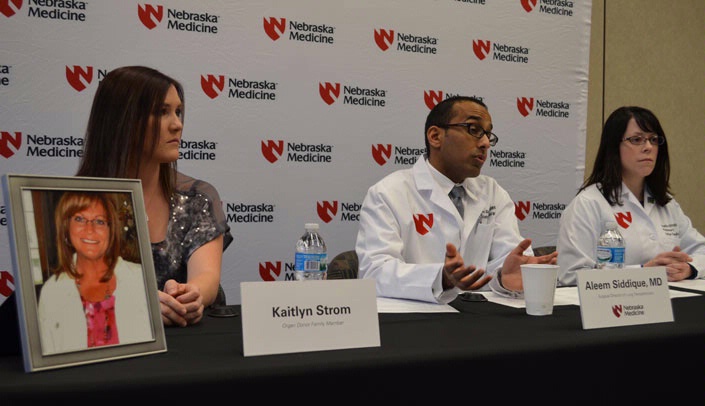Solid organ transplantation is one of the true success stories at UNMC/Nebraska Medicine.
It wasn’t that many years ago that some organ transplants were considered experimental, and it was difficult to get insurance companies to cover them. My, how times have changed!
Today, organ transplantation is widely accepted, and hundreds of thousands of people are alive and well because of it.
As you’ve probably heard, UNMC/Nebraska Medicine has re-started its lung transplant program. The addition of lung transplantation makes UNMC/Nebraska Medicine one of only a few institutions nationwide to offer all solid organ transplants.
This will mark our second venture into lung transplantation. Between 1995-1998, a total of 21 lung transplants were performed at UNMC/Nebraska Medicine, but then one of our surgeons died and another left and the program was discontinued.
As we re-start the program, the goal in the first year is to evaluate between 20-30 patients and transplant 10 patients. It’s an ambitious goal, but it demonstrates the strong commitment we have to the program.
Transplants are a huge endeavor. They demand a multidisciplinary team of surgeons, physicians, respiratory therapists, psychologists, social workers, dietitians, nurses and many others.
As we reflect on organ transplantation and how important they are to the success of our medical center, I want to acknowledge Dr. Alan Langnas, who has led our organ transplantation program for the past 19 years, and Dr. Bud Shaw, who came to UNMC in 1985 and really got the transplant program up and running. Both, as well as the teams that they assembled, have been critical to program’s success over the history of our medical center.
Over the years, more than 7,000 transplant procedures have been performed at UNMC/Nebraska Medicine. In recent years, we’ve been averaging around 250 total transplants per year.
One area that has especially seen increased volume is the heart transplant program. This program started in 2005, and for the first nine years we never did more than 23 transplants in a year. For the past two years, we have exceeded the 30-transplant threshold. I look for this program to continue to grow and recognize the leadership of Dr. Michael Moulton in this success.
Obviously, there are many more potential organ transplants than organs available for them – there just aren’t enough organs to go around. Each day, 18 people die while waiting for an organ transplant.
I’d like to encourage all of you to consider being an organ donor. It’s truly the gift of life. A single donor can save up to eight lives.
With the holiday season upon us, I want to conclude by extending my best wishes to all of you. I hope you will be able to enjoy some time off with your family.
On a separate note, I want to close with a special thank you to Ruth and Bill Scott, whose generous donation will allow us to build a world-class inflammatory bowel disease center. The Scotts’ generosity has truly transformed our campus over the past decade. We are honored that they have chosen to invest in our medical center.
I wish you each a happy holiday season and a great new year.
